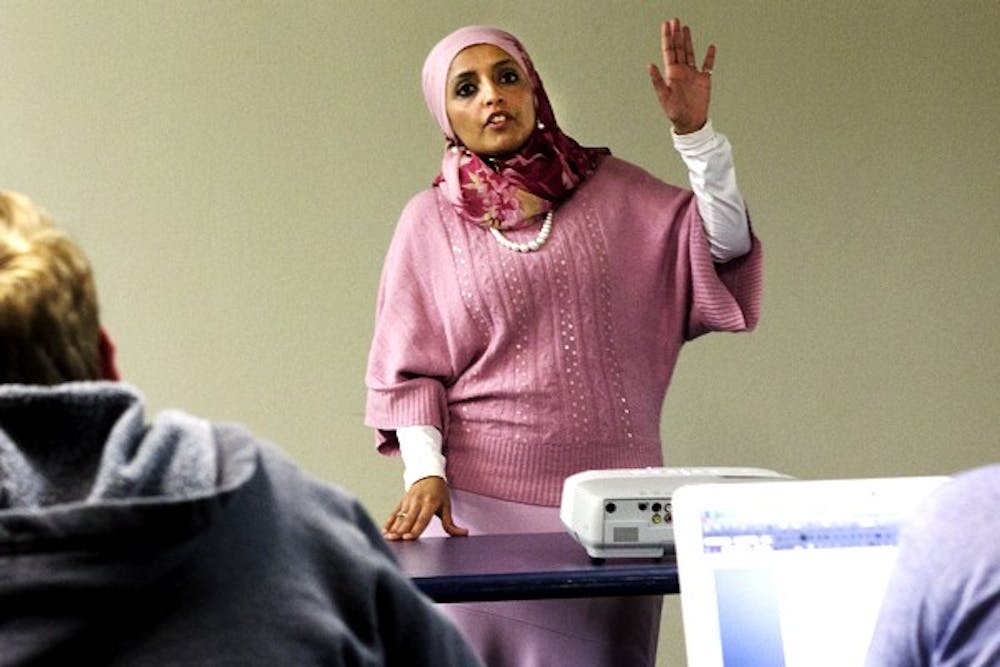Dinner Dialogue talks politics, stereotypes about women in Yemen, Middle East
Fulbright Scholar and Yemen native Asma Dammag talked politics, education, culture, religion and stereotypes at a dinner dialogue Monday night.
Starting at 6 p.m., Calkins Residence Hall hosted the dinner that discussed Women in Yemen and the Middle East. The free event featured a presentation by Dammag, who is finishing up a master’s degree in Teaching English as a Second Language this spring.
After a majority of attendees had finished eating the traditional Middle Eastern meal that was served, Dammag opened up the dialogue.
“What do you know about Yemen?” she asked the audience of 13.
When few replied, she said Yemen is a country located in Southwest Asia with about 25 million people, whose main language is Arabic.
“Yemen has been mentioned in all three celestial religions: Christianity, Judaism, Islam,” Dammag said. “It is in the Bible, Torah, Quran; mainly because of the story of the queen of Sheba who went to visit King Solomon.”
She said contrary to what many believe, not all of the Arab world is wealthy.
“We are not all rich. Majority of Arabs are poor or middle class. We are 22 countries — you cannot say we are all rich,” she said. “Currently, Yemen is considered a developing country. It is a poor country. We depend on oil a lot, but we don’t have that much oil, like Saudi Arabia.”
Several audience members asked questions regarding women’s clothing, specifically scarves and veils.
“One hundred years ago, even women here were wearing very long dresses,” Dammag said. “Kind of like the Amish or some religious Christian groups, it’s part of our religion that says ‘Don’t show off, be modest.’ Some are more conservative, other are more liberal.”
She said she had some stereotypes of the U.S. before arriving, but soon realized they were not wholly true.
“I cannot say everyone is George Bush,” Dammag said. “Everyone is different.”
Dammag also discussed the current political situation in Yemen.
“You grow up feeling like you have no future, no hope for a good education, no hope for jobs,” she said. “But these people are growing richer and richer and they are controlling everything. That was one of the main reasons that people started rebelling against them.”
Dammag said it is frustrating that not all stories make it to the media.
“It’s very clear, because it’s not in the American’s benefit,” she said. “Like a poor country, what is the benefit? But for Saddam, they made him a Satan because there was benefit there; there was oil.”
Dinner Dialogues are held about three times each semester on various topics, said Cathy Warner, Calkins Residence Hall director.
“It’s a discussion and we can ask the questions that are uncomfortable, so we can break down those stereotypes and talk about the real issues,” she said.
Jason Sarkozi said Dammag’s presentation was “very informative, eye-opening and had great food.”
Sitting with his friends, Terri Eamsuk from Thailand and Elizabeth Hernandez from El Salvador, all three of whom are Central Michigan University graduates, said they were friends with Dammag and asked many questions so everyone else could hear her answer.
Calkins Hall will host its final Dinner Dialogue of the year at 6 p.m. April 18 in the Calkins Terrace Lounge. It will feature Sarkozi and his story about how he, a Michigan native, ended up in central China teaching Spanish. The event is free and food is provided.




